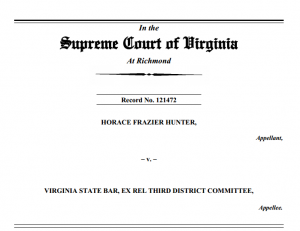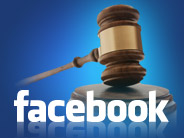 I follow Ben Glass’ Great Legal Marketing business on Facebook (you should too–link here!). He alerted followers that the Virginia State Bar, in a perplexing case, is attempting to regulate what lawyers can say on their blogs. The case, Hunter v. Virginia State Bar, is pending before the Virginia Supreme Court.
I follow Ben Glass’ Great Legal Marketing business on Facebook (you should too–link here!). He alerted followers that the Virginia State Bar, in a perplexing case, is attempting to regulate what lawyers can say on their blogs. The case, Hunter v. Virginia State Bar, is pending before the Virginia Supreme Court.
Ben graciously linked the briefs of the parties and the amicus briefs, so you can find them all in one location. Essentially, the Virginia State Bar is claiming that lawyers are not allowed to reveal information about their clients’ cases without client permission–not even non-confidential information is publicly available. Further, any discussion of a lawyer’s cases must be accompanied by a disclaimer (you know the one–these results may not be typical, every case has its own unique facts, etc., etc.).
One Hunter’s arguments, which I don’t entirely buy for the majority of attorneys, is that this is all First Amendment stuff and meant to only be informative. Truth be told, I think most of us agree that it is advertising. Sure, we place out in the hopes of helping other lawyers, and people with legal problems. But if some of those people find their way to our doorstep and we get a new case out of it, that’s just great, too. Not that there’s anything wrong with that.
Take a peek at the briefs. Want to know what to do in the meantime? Well, it depends on your state. Perhaps the safest course is to apply disclaimers and speak only in the most generic terms about cases you are handling (or, get client consent). Each state will have to start identifying and addressing these problems. Each lawyer will have to do what makes them comfortable.



